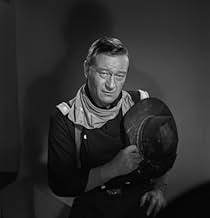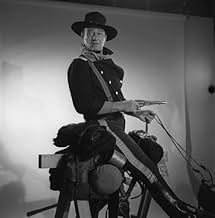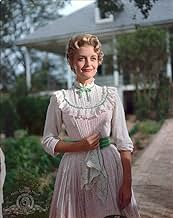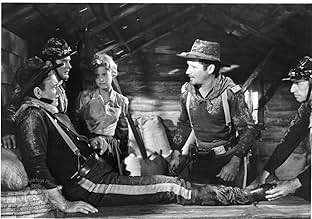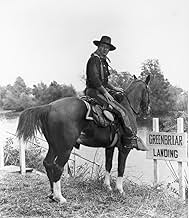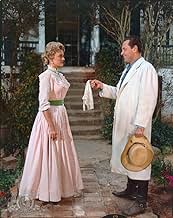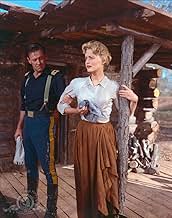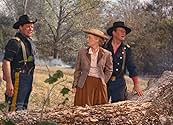En 1863, une équipe est envoyée derrière les lignes confédérées dans le Mississippi pour détruire les chemins de fer ennemis, mais une femme captive du sud et le médecin provoquent des frict... Tout lireEn 1863, une équipe est envoyée derrière les lignes confédérées dans le Mississippi pour détruire les chemins de fer ennemis, mais une femme captive du sud et le médecin provoquent des frictions dans les rangs.En 1863, une équipe est envoyée derrière les lignes confédérées dans le Mississippi pour détruire les chemins de fer ennemis, mais une femme captive du sud et le médecin provoquent des frictions dans les rangs.
- Réalisation
- Scénario
- Casting principal
- Récompenses
- 1 nomination au total
Avis à la une
It's the sort of Ford film that must have been hard on the actors, riding through swamps on horseback and engaging in fierce battles when pursued by Rebel forces. William Holden has some wonderful moments as a doctor who is constantly bickering with John Wayne. Their exchanges provide plenty of tension and humor--and both actors are at their best under Ford's direction.
A good Civil War western combining magnificent photography, good performances and some rousing battle scenes. The horrors of war are not ignored and there are some sentimental moments that never strike a false note.
Ford's battle scenes are as usual patriotically free of blood and require no reflection but the imagery is great (you want to join the cavalry) and the detail outstanding. We hear the clanking of canteens and cookpots, an argument over the placement of latrines and see the only filmic presentation of the making of Sherman Neckties (warped rails). The Ford family is well represented though we miss Harry Carey Jr (and Paul Fixx must have been tied up with the Rifleman).
If we had to have a love interest, Maureen Ohara could have at least tied this to "Rio Grande" and furthered the Ford library.
Normally wonderful Bill Holden has only brief bright moments and is mostly going through the motions and hung-over here. Neither Wayne nor Ford were slouches when it came to curling whiskey but by his own admission Holden aggravated all and threatened production with reckless, drunken extracurriculae, breaking an arm falling from a bridge.
This film was an inspiration in grade school and a guilty pleasure since.
John Ford always disparaged the films he made after Wings of Eagles, but in my opinion, The Horse Soldiers is one of his finest films. Also in my humble opinion he managed to get one of John Wayne's finest film performances. Wayne's a volunteer officer, in civilian life he rose from section hand on a railroad to an construction engineer. Holden calls him "section hand" as a term of derision after Wayne consistently refers to him as "croker."
Wayne and Holden were very close personal friends and friendly rivals at the box office. That's part of the reason that The Horse Soldiers is so good, the chemistry between them. In fact when Wayne died in 1979, Holden was said to have gone on one legendary drinking binge. Who would have suspected we'd have lost him as well two years later.
Holden as the doctor has a less flamboyant part than Wayne, but he makes the most of what he was given. I suspect knowing the relationship between Wayne and John Ford, he knew going in his part would be less, but he did it anyway.
Anyone who thinks John Wayne incapable of acting should see the scene in the saloon at Newton's Station after the Union forces repel a Confederate attack and are about their business destroying the railroad property. In a great drunk scene he reveals to Constance Towers the reason for his hatred of the medical profession. I won't reveal it, but it's something we can all understand. Wayne did this scene so well that Ford used an abbreviated version of it in The Man Who Shot Liberty Valance.
Ford makes marvelous use of music in there, weaving traditional Civil War era songs with the song written by Stan Jones for the film, I Left My Love. That is one catchy and infectious ballad, one of the best things written for a John Ford movie. Incidentally Stan Jones makes a brief appearance in the film as Ulysses S. Grant and does well by him.
There are two in the supporting cast that deserve mention. During the Civil War Lincoln had to deal with volunteer political generals, most of whom were a flop. Willis Bouchey playing John Wayne's co-commander in the expedition captures the phenomenon to perfection. He's argumentative, arrogant, and a general pain in the butt to Wayne. It's probably Bouchey's finest screen performance.
And Carleton Young also gives what I think is his finest screen performance as the one armed Confederate colonel who tries in vain to stop Wayne from completing his plans. It's a role that requires dignity and strength and Carleton Young is marvelous. In fact the contrast between Bouchey and Young as soldiers is pretty obvious.
The relationship between the Section Hand and The Croker evolves during the running time of The Horse Soldiers. It's a relationship well worth seeing develop.
Colonel John Marlowe (John Wayne) is ordered by the Union generals to lead his army 300 miles into the Confederacy, where they are to sabotage and disrupt the vital railway supply town of Newton Station as much as possible. After a disastrous few months of lost battles and heavy casualties, the Union generals are determined to swing the battle back in their favour before the arrival of winter. Marlowe is unhappy to learn that his orders include allowing army surgeon Major Kendall (William Holden) along on the mission. Since the death of his wife at the hands of two blundering surgeons, Marlowe has had little respect for those in the medical profession. To further complicate matters, a feisty Southern belle, Hannah Hunter (Constance Towers) with Confederate sympathies, overhears Marlowe informing his men that Newton Station is the target, and that once the town has been raided the Union forces plan to head for the safety of Baton Rouge. In order to secure her silence, Marlowe has to take her prisoner and suffer her sharp Southern tongue (plus escape attempts) during the trip.
The Horse Soldiers is filmed in loving detail, with gorgeous autumnal backdrops. Its story is very interesting, especially the volatile relationship between Wayne and Holden, and the mission itself provides excitements along the way. In particular, a street battle at Newton Station is memorable, as is a scene later in the film when the Union soldiers come under attack from an army of Confederate army cadets still at schoolboy age. Towers' character is written as a very cunning and feisty woman, who disguises her attributes by coming across as a melodramatic, gossipy airhead. Towers plays the part well, but because of how she's encouraged to handle the role she becomes rather irritating too. One disappointing moment in the film comes when Wayne and Holden reach breaking-point with each other and ride off to a secluded glade to slug it out. The sequence is set to be a real humdinger, but is curiously cut short by the arrival of the enemy forces. On the whole, though, The Horse Soldiers is a good, solid Civil War entertainment, well worth a look.
It's the Western Theater of the war and General Grant is setting up his siege of Vicksburg. In order to help ensure his position, he orders Colonel John Marlowe (John Wayne) to head south towards Newton Station, Mississippi, the Confederacy's main train station for supplies to Vicksburg, to destroy any contraband as well as the railroad itself. The mission requires secrecy and guts, heading hundreds of miles into enemy territory, and Marlowe is the man to do it. Before he sets out, he's assigned a new officer, Major Henry Kendall (William Holden), a surgeon who refuses to carry a gun. There's antipathy between the two men from the moment Kendall shows up in camp, but Marlowe follows his orders and takes him along.
In Mississippi, the column soon comes across an isolated country home, Greenbriar, where Hanna Hunter (Constance Towers) and her servant slave Lukey (Althea Gibson) are waiting out the war. After some feigned hospitality, Kendall notes that Hunter is spying on Marlowe's officer meeting, hearing their plan to head straight through past Newton Station once it's sacked to Baton Rouge. Feeling like there's no choice, Marlowe decides to take Hanna and Lukey along so they won't give up the column's position, mission, or destination. So begins the ineffective romance between Marlow and Hanna that starts as a meet cute and never really moves past. She becomes slightly enamored of him because of his...well, it's not entirely clear why. He's a hard man, a dedicated Northerner, a man bred from a lower class (he's a train engineer without a formal education), but he does have a certain sense of honor that she finds attractive, I suppose, most notably when the column comes across a pair of Confederate deserters who have taken the local sheriff hostage. Marlowe gets some information from the deserters before knocking them out and handing them off to the sheriff with a tip of the hat.
There are two great moments in this film, and the first comes in Newton Station. They arrive in the little town with the people, mostly women, screaming at them to go home, and Marlowe figures out that the local Confederate colonel has set up a trap with an approaching train engine that's filled with Confederate troops. The battle that erupts is a slaughter and so poorly thought out from a military point of view that it's a wonder anyone thought it would be a good idea to include in the film (this isn't the great part, it's coming). Then the troops get to work on destroying the railroad, and it's just great to see the mechanics of what it means to tear up a railroad up to and including the creation of Sherman's neckties by wrapping the weakened iron railings around telegraph poles.
And then Wayne gives an impassioned speech about how much he hates doctors, and it's one of the oddest moments of the film. It feels like an idea made up on set rather than planned out. Marlowe hates doctors because some years ago two doctors convinced his wife that she had a tumor. They operated on her, they found nothing, and she died. To have this speech come up more than halfway through the film feels off, especially when this was the war where doctors were hacking off limbs with unclean equipment all the time. A speech about how doctors had lost him many good men during the fighting would have fit so much better. It would have applied to the situation at hand much more intimately, and operated as a direct challenge to Kendall who was in the same job. The use of a long-dead wife just feels random and off.
Anyway, the column moves on, and we get our second great moment of the film. Desperate for men (the scene ends up feeling like it should have taken place in late 1864 instead of early 1863, but whatever) a Confederate soldier shows up at the Jefferson Military School and begs for the headmaster to lead his students into battle against the Union cavalry that terrorized Newton Station. The old man, a reverend, organizing his boys of between 9 and 16 years old, into columns and leading them off to fight the dying cause (again...this fits better with a later in the war story, along with all the references to Andersonville that didn't open until 1864) while a widow begs him to let her have her only son left stay home is remarkably powerful. This could operate as a short film on its own, and it's great.
And then the students find the column, open fire, and Marlow refuses to fire on children while the movie ends up kind of treating the whole thing like a kind of joke.
The finale of the film is around a random bridge somewhere in Mississippi where Marlowe needs to fight off an approaching Confederate skirmishing force while another Confederate force comes upon them from another direction. It's not much of an action scene, doesn't seem to have much in terms of stakes, and doesn't really satisfy all that well. The actual ending of the film was apparently never shot because of the death of the stuntman during the filming of some action, and the movie simply stops with the Confederate column coming upon Kendall, who stayed behind to take care of the wounded.
This movie is kind of a mess, but there is some entertainment to be had. I find John Wayne watchable in just about anything he does, and since he's front and center for most of the film, he's an asset. Most of the looks at Confederate life carry a tinge of melancholy at their losing side that I appreciate. That bit with the boys leaving the military school is honestly outright beautiful in the anguish from the widowed mother. However, the story as a whole feels a bit random, the two major action sequences are lackluster, the romance simply doesn't work, and the professional rivalry between the two main male characters ends up feeling like something from a satire rather than a straight war picture.
I don't hate it, but this isn't exactly one of Ford's or Wayne's best efforts.
Le saviez-vous
- AnecdotesThe film marked the beginning of mega-deals for Hollywood stars. John Wayne and William Holden received $775,000 each, plus 20% of the overall profits, an unheard-of sum for that time. The final contract involved six companies and numbered twice the pages of the movie's script. The film, however, was a financial failure, with no profits to be shared in the end.
- GaffesIn the shot right after Hank Worden throws the torch onto the cotton bales, look at the upper left of the screen. You will see an airplane flying from right to left.
- Citations
Miss Hannah Hunter: [bending over with a plate of chicken, revealing ample cleavage] Do you prefer the leg... or the breast?
Col. John Marlowe: I've had quite enough of both, thank you.
- ConnexionsFeatured in Directed by John Ford (1971)
- Bandes originalesI Left My Love
by Stan Jones
Meilleurs choix
Everything New on Prime Video in July
Everything New on Prime Video in July
- How long is The Horse Soldiers?Alimenté par Alexa
Détails
Box-office
- Montant brut aux États-Unis et au Canada
- 1 753 526 $US
- Durée2 heures
Contribuer à cette page



